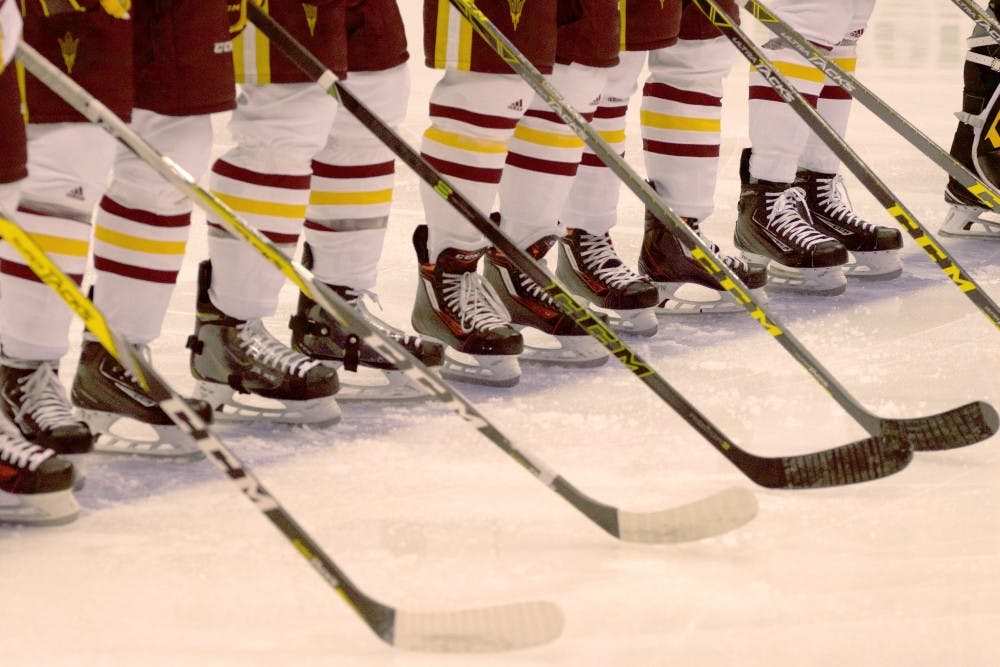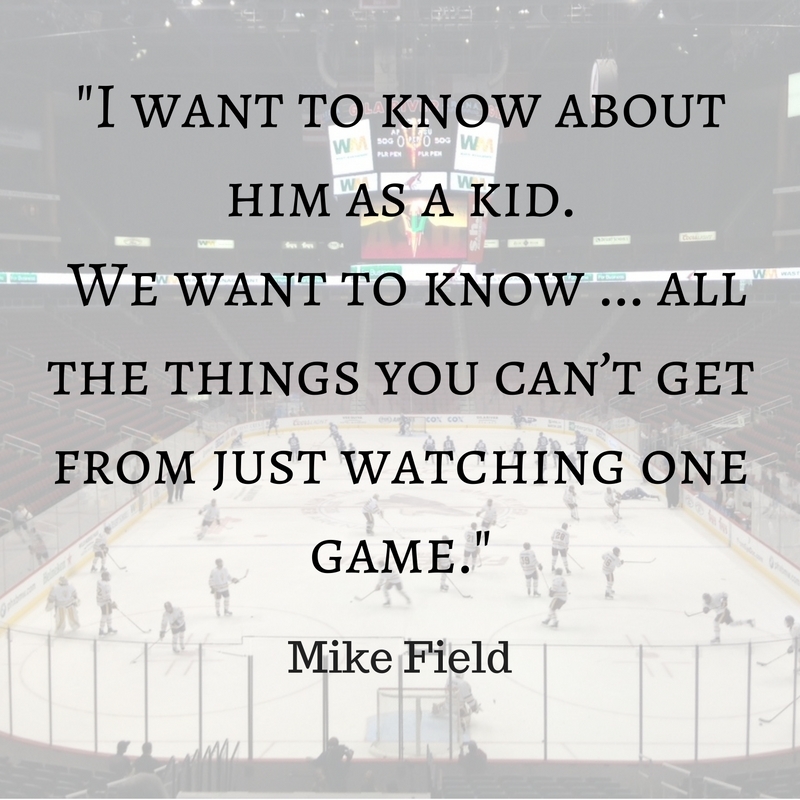On a Monday afternoon in Tempe, Arizona, ASU hockey head coach Greg Powers returns to his office after his weekly press conference.
While cordial, Powers carries a coach-like stoicism as he sits behind a large desk and in front of a window with a view from the third floor of Sun Devil Stadium. The former executive recruiter is now in charge of recruiting not CEOs for Fortune 500 companies, but often-teenaged hockey players for a desert university in its first full season of NCAA hockey.
Some of those players don’t wait for Powers and his staff to come to them.
“Anybody that proactively reaches out to us, they’ve got to set themselves apart from the masses,” Powers said. “I’ll get 20 emails a day from kids.”
Some of those kids merely send template letters to NCAA hockey coaches, changing only the school’s name and coach’s name. And sometimes, they forget to do the latter.
“I just got one today that was addressed to the head coach at Michigan State,” Powers said. That’s an instant delete for me. I don’t have time to deal with somebody if they’re not going to pay attention to detail.”
Perhaps it’s easier to decide who you don’t want for your team than who you do.
So, Powers and his staff of assistant coaches do most of the work themselves, not waiting on aspiring collegiate hockey players to contact them. For instance, when ASU hockey travels to University of New Hampshire and Boston College for two games this weekend, assistant coach Mike Field will be in Calgary, watching potential recruits.
A team effort
On that Monday, footsteps away from Powers’ office, Field was in a room of his own. He faced his computer, watching hockey footage and staring at graphics unrecognizable to a layperson. The scene was similar to an engineer reviewing plans for a new construction project.
Even with this meticulous scouting, the most important thing to the coaching staff is who the players are as people.
“I want to know about him as a kid,” Field said. “Character is the biggest thing, for the most part. If you’re watching, you can tell if a kid can shoot it, can skate, can think the game, competes hard, all that stuff.
"So you want to know from the coach what he’s like in the locker room, if he’s a good teammate, a good person, what kind of grades — basically all the things you can’t get from just watching one game.”
Once Field or assistant coach Alex Hicks feels that a player meets the criteria for becoming a Sun Devil, that player is put in touch with Powers.
“Generally, by the time I call a kid or proactively start to sell him, we have a good idea that we’re going to want him,” Powers said. “So, at that point in time, it’s pretty much me selling the program and what we’re building, and being the tradition and what our vision is for what we’re going to become.”
Carting and courting
Part of the program’s budget includes provisions for paying for official visits, during which players will fly to Tempe and see what the school and team have to offer first-hand.
“I definitely take a more proactive approach in recruiting than most head coaches,” Powers said. “I’ll pick kids up at the airport on official visits, I’ll take them to dinner, I’ll take them to lunch, I’ll take them on campus tours. Where most of the time, in hockey, the coach meets with the kid for 10-15 minutes on a trip and that’s it.”
On those visits, Powers gives the player an all-encompassing visit, including a campus tour on a golf cart, a view of the rink at Oceanside Ice Arena, and a sit-down with the academic coordinator.
“We’ll have them meet with the athletic directors and sit down with them, they talk to them about what the vision is overall for our program, back up what we say,” Powers said. “That lets them hear from the people that I report to that everything I’m telling them is real. There’s not many schools that do that."
A match made in Tempe
When asked what player visit stands out most in Powers’ memory, he recalled Tyler Busch, a freshman forward from Canada.
“(Busch) and I just hit it off,” Powers said. “You just connect with a kid and you know it. He reminded me of my captain from Manitoba that we won a national championship with. The way he carried himself and his respect level, you can just see the look on his face, he wanted to be a part of this.”
Welcome Spruce Grove Captain Tyler Busch (@BuschLeagueTen) to 2016-17 Sun Devil Hockey! #BetheTradition pic.twitter.com/z1T4qFyB3D
— Sun Devil Hockey (@SunDevilHockey) April 13, 2016
Busch committed to Ohio State originally but pulled his commitment and began seeking other opportunities. Busch said that in that fateful visit to ASU, it was a “no-brainer” to join what they’re trying to build.
“(My visit) was pretty cool because I got to see a game,” Busch said. “They had their Desert Classic tournament, so I saw them play Yale. I kind of got the full experience with seeing a practice in the morning and then heading out to Glendale and seeing a game. I really got the full package on my visit, so I was lucky.”
He remembered the golf cart tour that Powers mentioned, too.
“We took a tour of the campus, and obviously I was blown away by it. It’s a pretty unique situation to have a hockey team in Arizona and really great weather. But at the end of the day, I was really here trying to learn lots about the program, the coaching staff, all the players and the tradition they’re trying to build here.”
Sometimes, recruiting doesn’t come via Powers, Field or Hicks. Busch said that when he pulled his commitment from Ohio State, the first person to reach out to him was current ASU captain Dylan Hollman. Hollman and Busch met while playing together for the AJHL’s Spruce Grove Saints.
The never-ending effort
Many players, though, won’t have the advantage of knowing a close friend on the team recruiting him. That’s where the ASU hockey coaching staff steps in, trying to convince kids that the experience in Tempe is up to par with traditional college hockey destinations.
Some players choose those traditional programs.
“That’s perfectly okay,” Powers said. “They’re just not the kind of kid we want and need here right now. You have to want to be here. You have to really want to put in the work to build something, because we’re in the build stage.”
Or some, like the recruiting class that joined Sun Devil hockey this year, see advantages that the ASU offers. One of those is the variety of academics.
“A lot of kids say, ‘Well, I don’t know what I want to be,’” Powers said. “’I haven’t thought about it. I’ve got to figure that out.’ That’s an advantage that we have because you could study just about anything you want. It’s not a small school with 10 or 15 degrees or majors.”
Regardless of Powers’ success in bringing in top players, the grind to recruit never ends. When he and his coaches are in contact with a player, they never know when duty will call.
“When you go home, just because you’re home and you’re watching a football game or having dinner with your wife and kids, doesn’t mean that you’re off the clock,” he said. “If a kid or a junior coach calls, an advisor calls and they want to talk, you’ve got to be available.
“So, it’s cyclical. It’s 24/7.”
Reach the reporter at matthew.layman@asu.edu or follow @Mattjlayman on Twitter.
Like State Press Sports on Facebook and follow @statepresssport on Twitter.





